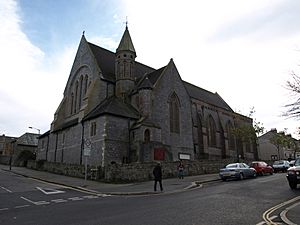All Saints' Church, Falmouth facts for kids
Quick facts for kids All Saints' Church, Falmouth |
|
|---|---|

All Saints' Church, Falmouth
|
|
| 50°09′04″N 05°04′35″W / 50.15111°N 5.07639°W | |
| OS grid reference | SW 802 325 |
| Denomination | Church of England |
| Churchmanship | High Church |
| Website | http://www.allsaintschurchfalmouth.co.uk/ |
| History | |
| Dedication | All Saints |
| Administration | |
| Parish | Falmouth, Cornwall |
| Deanery | Carnmarth South |
| Archdeaconry | Cornwall |
| Diocese | Truro |
| Province | Canterbury |
All Saints' Church, Falmouth is a special church in Falmouth, Cornwall, a town in the United Kingdom. It belongs to the Church of England and is part of the Diocese of Truro. This church is known for its beautiful design and rich history.
Contents
History of All Saints' Church
The building of All Saints' Church began a long time ago. The very first stone was laid in 1887. This important event was done by Albert, Prince of Wales. He later became King Edward VII.
The church was designed by a famous architect named J. D. Sedding. He used a style called Gothic Revival. This style brings back the look of old medieval churches. It often includes tall windows and pointed arches. The church has narrow side aisles. It also has a very large window at the east end. This window is made of five tall, narrow sections.
The church was officially opened on April 17, 1890. Bishop Herbert Bree led the special ceremony. He stepped in because Bishop George Wilkinson of Truro was unwell.
Building and Art in the Church
John Dando Sedding designed many parts of the church. These include the wooden choir stalls. These are the special seats where the choir sings. They were carved by a company called Trask & Co. He also designed the font, which is a basin used for baptisms. This font is made of Devon marble.
After John Dando Sedding passed away, his nephew, Edmund Harold Sedding, continued his work. In 1895, Edmund designed the amazing pulpit. A pulpit is a raised platform where sermons are given. This one was made from alabaster and marble. It was crafted by J. & E. Goad. In 1908, Edmund also designed the reredos. This is a decorated screen behind the altar. Many beautiful wooden carvings in the church were made by the Pinwill workshop.
Vicars of All Saints' Church
A vicar is a priest who leads a church parish. Here is a list of some of the vicars who have served All Saints' Church:
- Thomas Taylor was the first vicar from 1890 to 1892.
- Montague Williamson served from 1918 to 1924. He later became an Archdeacon.
- Clifford William George Wood was vicar for a long time, from 1924 to 1963.
- Raymond Lockwood Ravenscroft served from 1964 to 1968. He also became an Archdeacon later.
- Donald Young OBE was vicar from 1969 to 1970.
- Peter Eustice served from 1971 to 1976.
- Edwin George John Stark was vicar from 1977 to 1980.
- Albert Edmund Angus Murray-Stone served from 1981 to 1983.
- Peter Watts was vicar from 1984 to 1994.
- James Stanley Scantlebury served from 1994 to 1998.
- Stephen Drakeley was vicar from 1999 to 2016.
- Bill Stuart-White has been the vicar since May 2018.
The Church Organ
All Saints' Church has a very special organ. It was built in 1894 by Hele & Co of Plymouth. At the time, people said it was the second best organ in Cornwall. Only the organ in Truro Cathedral was considered better. The organ case, which holds the pipes, is made of oak. It has beautiful carvings that add to the church's beauty.
How the Organ Grew Over Time
The organ cost £750 to build in 1894. Some parts of it were planned but not built right away. In 1926, Henry Speechly & Sons cleaned and fixed the organ. They also added new parts. These new parts helped the organ make more sounds. They also added an electric blower. Before this, people had to pump air by hand to make the organ play!
In 1950, Roger Yates worked on the organ. He cleaned all the pipes. He also added more features to make the sound even better. Roger Yates was a very skilled organ builder. He learned from Henry Willis III, a famous organ maker. Roger Yates was known for making organs that sounded perfect in their buildings. He made the All Saints' organ sound very bright and powerful. He also made the different sounds blend together well. Many famous organists have said that this organ is one of the best in the county.
Since 2015, Henry Willis and Sons have been taking care of the organ. They tune it and make sure it stays in excellent condition.
Organists of All Saints' Church
An organist is the person who plays the organ during church services. Here are some of the people who have been organists at All Saints' Church:
- 1890 W J Shoosmith
- 1903 Claire Cooper
- 1919 Francis Basset Rogers MA
- 1941 Ade Knocker ARCO
- 1946 Frederick J Herbert
- 1957 Leslie Millington
- c1962 Alan Hall B Mus FRCO
- c1970 Andrew Scrope-Shrapnel
- 1974 Michael Maine
- 1976 Alan Hall BMus FRCO
- 1980 John Clark
- 1990 Andrew Jenkins
- 1995 John Sherriff
- 2004 Roger King
- 2012 Matthew Seaton
- 2014 Daniel Shermon
 | Frances Mary Albrier |
 | Whitney Young |
 | Muhammad Ali |

